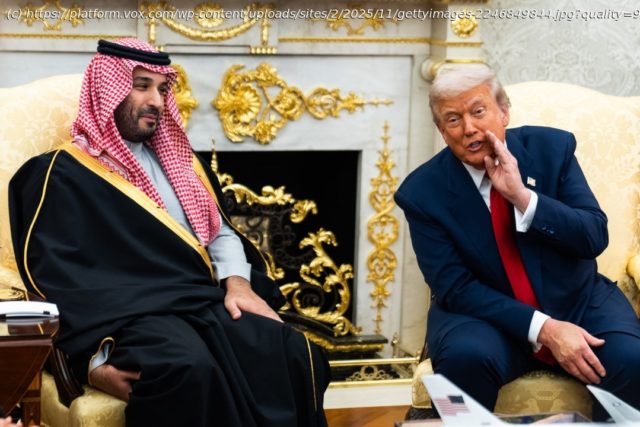Why there could still be trouble ahead for the US-Saudi relationship.
The most shocking thing about President Donald Trump’s Oval Office meeting with Saudi Crown Prince Mohammed Bin Salman on Tuesday was that anyone was shocked by it.
The main headline coming out of the two leaders’ combative session with reporters was Trump’s blasé dismissal of a question about the 2018 murder of columnist Jamal Khashoggi, which was arguably the biggest challenge to US-Saudi relations since the 9/11 attacks, and which US intelligence reports have concluded the crown prince personally ordered.
“A lot of people didn’t like that gentleman that you’re talking about. Whether you like him or didn’t like him, things happen, but he knew nothing about it, and we can leave it at that,” Trump said.
But Trump had made similar remarks to these just weeks after Khashoggi’s death in 2018, issuing an official statement that referenced Saudi accusations that Khashoggi was an “enemy of the state” and member of the Muslim Brotherhood, and concluding: “It could very well be that the Crown Prince had knowledge of this tragic event — maybe he did and maybe he didn’t!”
It’s hard to imagine any other president talking about a foreign state’s murder of a journalist and US resident this way, not to mention dismissing the conclusions of his own country’s intelligence agencies this way. Nor has any other president had the kind of personal business ties to the Kingdom while in office that Trump and his family enjoy. But Trump is hardly the first president in the 80-year history of relations between the world’s most powerful democracy and its most powerful absolute monarchy to conclude that the relationship is too important to let human rights get in the way.
To take the most recent example, in 2020, Joe Biden promised on the campaign trail to make the crown prince widely known as MBS a “pariah” on the world stage for Khashoggi’s murder and accused the Saudi government of “murdering children” in Yemen. But the spike in global oil prices following the Russian invasion of Ukraine led to Biden’s infamous fist bump with MBS in Riyadh in 2022. Prior to the October 7, 2023, Hamas attacks on Israel, the Biden administration was pushing a three-way deal involving a mutual defense treaty between the US and Saudi Arabia, Saudi-Israel diplomatic normalization, and progress toward an Israeli-Palestinian two-state solution.
That deal never came to pass, but the general thinking behind it has continued into the second Trump administration, now coupled with a far chummier relationship between the two leaders. On Tuesday, Trump mocked the Biden fist bump, saying, “I grab that hand. … I don’t give a hell where that hand’s been!”
The relationship between the two leaders may be almost cartoonishly close at this point, but there are still limits to just how much the two countries can get from one another.






